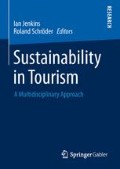Abstract
Tourism, as one of the largest global economic sectors, plays an increasingly important role in the development of economically weaker countries and peripheral areas which do not possess raw materials or traditional industries. For these countries and destinations, tourism provides a tempting promise, as it can be quickly developed and attracting potential tourists seems a viable economic product.
Access this chapter
Tax calculation will be finalised at checkout
Purchases are for personal use only
Preview
Unable to display preview. Download preview PDF.
References
Holloway, C. (2009), The business of tourism, 8th Ed., Pearson Education Ltd., Harlow.
Hopfenbeck, W., Zimmer, P. (1993), Umweltorientiertes Tourismusmanagement: Strategien, Checklisten, Fallstudien, Landsberg/Lech.
Hunter, C. (1997), “Sustainable tourism as an adaptive paradigm”, in Annals of Tourism Research, No. 4, pp. 850–886.
Lominé, L., Edmunds, J. (2007), Key concepts in tourism, Pelgrave Macmillan, New York.
Müller, H. (1995),“Regionale Nachhaltigkeit – von der Idee zum Leitbild regionaler Entwicklung” in Steinecke, A. v. (Ed.), Tourismus und nachhaltige Entwicklung – Strategien und Lösungsansätze, Europäisches Tourismus Institut, Trier, pp. 11–18.
Osterloh, G. (1997),“Der Reisestern: Regionalisierung eines Modells zu Evaluation der Nachhaltigkeit von Reisen am Beispiel der Bundesrepublik Deutschland” in Becker C. (Ed.), Beiträge zur nachhaltigen Regionalentwicklung mit Tourismus, Verlag für universitäre Kommunikation, Berlin, pp. 57–76.
Porter, M. E. (1990), The Competitive Advantage of Nations, Free Press, New York.
Porter, M. E. (1998), “Clusters and the new economics of competition”, Harvard Business Review, Nov./Dec. , pp. 77–90.
Scheyvens, R. (2002), Tourism for development. Empowering Communities (Themes in Tourism), Pearson Education Ltd., Harlow.
Steinecke, A. 1(995), “Tourismus und nachhaltige Entwicklung: Strategien und Lösungsansätze“, in Steinecke, A. (Ed.), Tourismus und nachhaltige Entwicklung – Strategien und Lösungsansätze, Trier, pp. 7–10.
World Commission on Environment and Develepment (Ed.) (1987), “Presentation of the report of the commission on environment and development to UNEP’s 14th governing council session”, Nairobi.
Author information
Authors and Affiliations
Corresponding author
Editor information
Editors and Affiliations
Rights and permissions
Copyright information
© 2013 Springer Fachmedien Wiesbaden
About this chapter
Cite this chapter
Meuser, T., von Peinen, C. (2013). Sustainable Tourism “Wish you weren’t here”. In: Jenkins, I., Schröder, R. (eds) Sustainability in Tourism. Springer Gabler, Wiesbaden. https://doi.org/10.1007/978-3-8349-7043-5_5
Download citation
DOI: https://doi.org/10.1007/978-3-8349-7043-5_5
Published:
Publisher Name: Springer Gabler, Wiesbaden
Print ISBN: 978-3-8349-2806-1
Online ISBN: 978-3-8349-7043-5
eBook Packages: Business and EconomicsBusiness and Management (R0)

